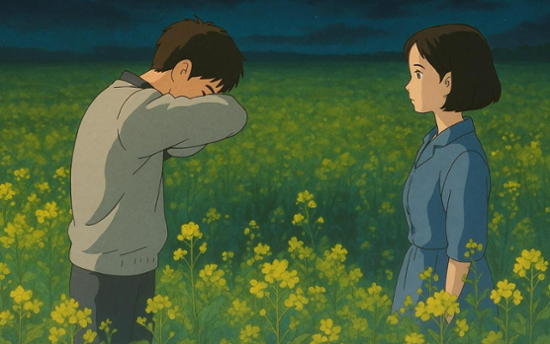Studio Ghibli-inspired AI feature sparks copyright debate
This image-generation feature has sparked a surge of creativity among users, inspiring them to experiment with different photos and share the results online. The ability to replicate the iconic Studio Ghibli style has garnered widespread attention and praise from fans of the animation studio. Many are amazed by the AI's ability to recreate the enchanting and magical aesthetic of Studio Ghibli films. As a result, social media platforms are abuzz with these charming and nostalgic reinterpretations of everyday images.

Seen above is a reimagined image in the distinctive style of Studio Ghibli using ChatGPT-4o, from the below image of a scene from the Netflix series “When Life Gives You Tangerines.” Captured from @edityou.kr on Instagram
Animation industry fears impact on human creativity
By Baek Byung-yeul
A new image-generation feature in OpenAI’s ChatGPT-4o, allowing users to transform ordinary photos into visuals that resemble the distinctive style of Studio Ghibli animations, is taking the internet by storm, flooding social media feeds with whimsical portraits reminiscent of works by legendary animator Hayao Miyazaki. However, at the same time, this viral trend is sparking a fierce debate over copyright, artistic ownership, and the future of creative industries in the age of generative artificial intelligence (AI), according to industry officials.
This popular AI feature raises critical questions about copyright infringement through training data and fuels fears of artistic devaluation among creators. While AI is evolving into a powerful assistive tool for animators, there still are unresolved legal and ethical challenges.
The new ChatGPT feature enables users to simply request images in the iconic aesthetic of the Japanese animation studio led by Miyazaki, widely known for its heartwarming picture style and soft textures. The ease of use has led to widespread adoption, turning the AI tool into a form of entertainment and content creation, extending beyond Studio Ghibli to mimic iconic styles like Pixar, Disney, and "The Simpsons."
However, this Ghibli-style craze has brought the complex issue of AI and copyright law to the forefront, as it is still unclear whether mimicking a distinctive artistic style constitutes copyright infringement. Currently, OpenAI has not disclosed whether it secured licensing agreements with Studio Ghibli or explicitly confirmed if Ghibli's artwork was used in the AI's training data. This lack of transparency is central to the controversy.
"Copyright law fundamentally protects the 'expression' of human thoughts or feelings in a creative work," Kim Min-ji, a visiting professor at the Media Convergence and Content Department at Kyonggi University, said. "Traditionally, an artist's specific style or manner, like that of Ghibli or the way van Gogh painted, is not explicitly covered by copyright protection. It's considered more of an idea or technique."
Seen is the X account of OpenAI founder and CEO Sam Altman. He used a Ghibli-style portrait created with ChatGPT-4o for his account profile. Captured from X
Legal Implications and Ethical Concerns
Because of this distinction, the professor said that merely mimicking the Ghibli style might not automatically qualify as infringement under current laws. However, Kim added that there would be potential legal issues if OpenAI used Studio Ghibli's copyrighted works for the training of their AI model without permission.
“We can infer that OpenAI likely trained its AI on Ghibli-style works to achieve these results. A potential legal issue may arise if Studio Ghibli's copyrighted works were used for this training without permission or agreement. If Ghibli decides to sue, this unauthorized use of data for training would be the central point of contention,” Kim said. “The debate centers on whether training AI for commercial profit without individual consent constitutes fair use.”
Impact on the Creative Sector
This technological leap is sending shockwaves through the creative sector as well because it's unclear at this point how this rapid technological development will affect content creation industries. Kim, an art tutor specializing in preparing high school students for animation programs, shared the anxiety among aspiring artists and their families.
"We receive many inquiries from parents worried if pursuing an animation major is still viable," she said. "The speed of technological advancement is staggering. There's a real sense of crisis among creators, myself included, seeing how easily and quickly AI can generate something that traditionally took immense time and effort."
However, she also offered a more complex perspective. "While [it is] concerning, I believe the impact might not be as devastating as some fear. This technology could be seen as a tool that makes content creation more convenient, potentially aiding human creativity rather than replacing it entirely." Kim requested to be identified by her surname only due to privacy concerns.
Global Concerns and Future Outlook
The Ghibli-style trend, though viral and seemingly light-hearted, has become a flashpoint in the ongoing global conversation about AI's role in the creative process, raising concerns about intellectual property rights and the value of human creativity.
"This service is definitely causing a significant shift in the industry,” an official from a Korean AI startup industry said. “However, market formation will likely take time until major hurdles like copyright issues and large-scale data usage ethics are properly addressed."

